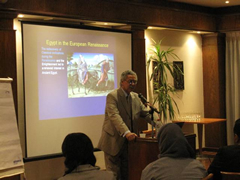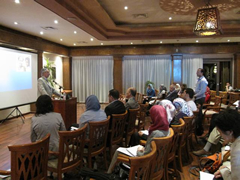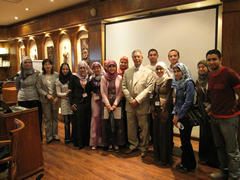- Home
- Technical Cooperation Projects
- Index of Countries
- Middle East
- Egypt
- The Project for the Conservation Center in the Grand Egyptian Museum
- Project News
- The First Lecture Held to Re-think of the Grand Egyptian Museum
Project News
2010-04-30
The First Lecture Held to Re-think of the Grand Egyptian Museum
 Professor Fekri Hassan during the lecture
Professor Fekri Hassan during the lecture
On the 29th of April 2010, one of the experts in cultural heritage, museums and Egyptology was invited to give the first lecture of a series which provides an opportunity to the ADD to think about the importance of their job and to get a general idea of the Grand Egyptian Museum future.
Since it is the first lecture of the series which requires a celebration, Fekri Hassan, Professor Emeritus at the Institute of Archaeology in London University, gave a lecture entitled “Rethinking Ancient Egypt – A New Agenda for a Better Future”. Professor Hassan has a leading role in the process of defining and developing the cultural heritage and in building knowledge of the Grand Egyptian Museum.
 Time for questions
Time for questions
In the beginning of the lecture he explained the impact of Ancient Egypt in the history of Western Europe during the period following the Greek Era as it is a symbol of power and a source of knowledge, considering the monuments of Ancient Egypt such as obelisks and the Rosetta stone to be treasures of a high value. He added that they were the subject of movies, one of the means of entertainment during the post-colonial period. Then he explained how they dealt with social values and morals of Ancient Egypt monuments.
On the other side, he talked about the negative impression which has to be corrected when we deal with monuments as “remains” of the past. He added that if we analyze the golden treasures of Ancient Egypt we can reach a golden wisdom and we would know how much it is beneficial to the future of humanity.
Then, we can use the heritage of Ancient Egypt, as the main coordinator of the global era, to be the way to search for the human identity. Moreover, we can train the local people and create jobs related to the cultural and natural heritage with very little funding to mitigate the problem of poverty. Furthermore, it is only through the knowledge of the past one can cope with the problems of the present and future exactly like coping with climate changes, yet it enables us to set the agenda for a better future.
He also explained that there are certain policies that comply with the implementation of the agenda such as participating in the community heritage management, developing the skills of the experts of this field and providing ways of awareness like involving different cultures and nationalities in the field of heritage studies. The construction of the great foundation, Grand Egyptian Museum, is one of these policies which will also play a leading role being a center of world culture.
 Commemorative photo at the request of the staff
Commemorative photo at the request of the staff
After the lecture the staff asked many questions like “What can we do to change the current status while leaders are hindering any change?” and “To what extents can we make people feel they belong to their civilization?” and they asked also if Egyptians does not work for their future relying on four thousand years civilization. Professor Hassan replied to the query regarding the distance between specialists and ordinary people by denying the existence of this distance since the ordinary people themselves are the ones who inherited the Egyptian spirit across generations. He also confirmed that humility is the best way to get knowledge which impressed everyone.
This lecture helped the ADD staff to have a deep understanding of the role of Ancient Egypt in the global era and the importance of the Grand Egyptian Museum and in the same time confirming the value of correcting the Artifacts Database. It is planned to continue this series of lectures to satisfy the intellectual side of the GEM staff.
- About JICA
- News & Features
- Countries & Regions
- Our Work
- Thematic Issues
- Types of Assistance
- Partnerships with Other Development Partners
- Climate Change / Environmental and Social Considerations
- Evaluations
- Compliance and Anti-corruption
- Science and Technology Cooperation on Global Issues
- Research
- JICA Development Studies Program / JICA Chair
- Support for the Acceptance of Foreign HRs / Multicultural and Inclusive Community
- Publications
- Investor Relations
